- Feb 3, 2024
- LitBits
- 0
Just posted on SuperStack by Vagabond Heart – discussions in this thread, please
---
Mention the word Trope to us writers and we’ll recoil. Add the word Cliche and you’ll see us running for the hills. These two five-letter words are not what any of us want in our wonderful, new, original, works, right? But consider this: things only become tropes when they are overused, and they only become overused in the first place, because they work.
The main element of any self-respecting Korean drama is its repetitive use of tropes. I had no interest in Kdramas until a friend insisted I watch one. Then someone else recommended another, and before I knew it I was hooked. I’ve watched a fair few now, so trust me when I say I’ve done some research on this.
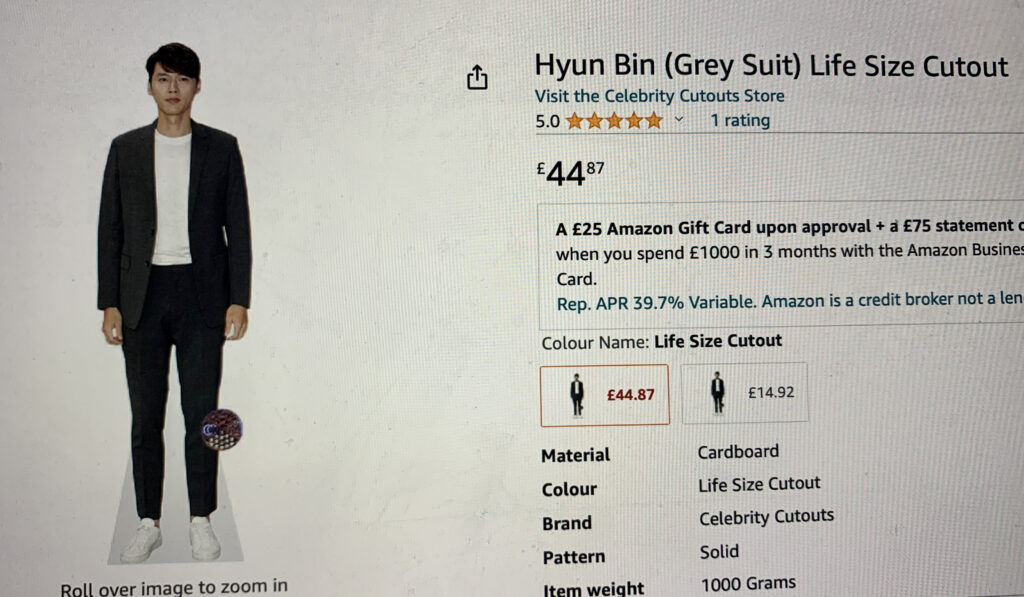
Because of my Kdrama viewing history, Amazon is helpfully suggesting things I might want to buy.
Amazon is not wrong – this is now top of my birthday list.
All love stories, whether they are Korean or not, have the same goal here – something that keeps our couple out of each other’s reach while they overcome all obstacles and/or fall desperately in love. But while the rest of the world seems to be looking for fresh new takes on the genre, the Koreans are quite happy to repeat the same basic formulas. These include…
From what I can see, Koreans value status, money and food. They also seem to equate being well-dressed (designer brands, obviously) with having good taste.
So as well as being tall, handsome, stupidly young looking, and having flawless skin, our hero will be rich, important, pimped out to the nines, and probably a good cook. Most often he’ll be the CEO of some global corporation, but if he can’t, then he’ll be a chef.
The only time he won’t be a good cook is if it’s a costume drama. In which case he is always the King.
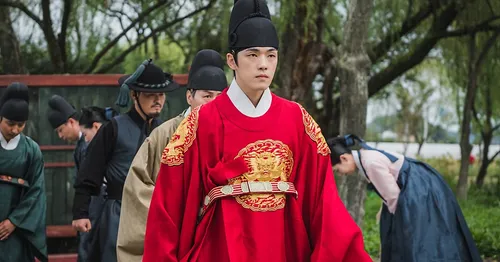
But he will be flawed. Every romantic hero I’ve seen, so far, has been some version of Mr Darcy. He tends to be rigidly cold, thoughtless, selfish, judgemental and vain, and has no interest in love whatsoever. It is the girl’s job to change him.
Our lady will be the hero’s perfect counterpoint, filling in the gaps of what he lacks. Ergo, she is usually poor, struggling, determind, generous, charming and kind. It goes without saying she is also incredibly pretty, has even more peach-perfect skin than he does, and is tiny, and I mean barely up to his shoulder.
She comes in two basic packages: sweet and hard-working, or fiesty and hard-working. Either way, she is Cinderella.
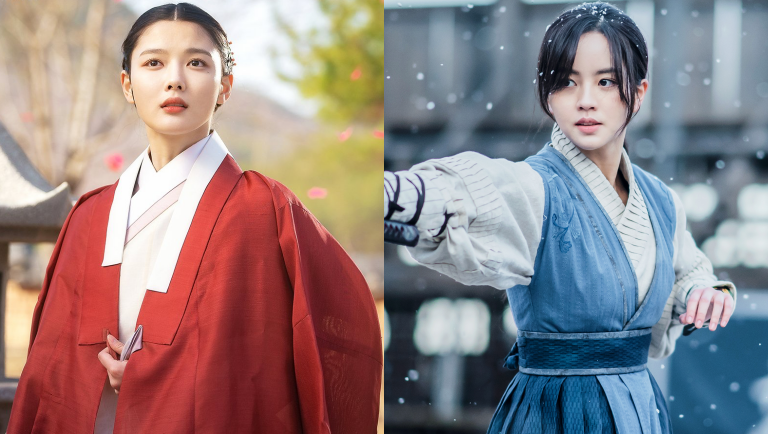
For Koreans, money and status are the obvious blocks. Different social class is a biggie. CEO guy is usually expected to make an arranged marriage of financial or social convenience, for the good of the Company.
When it’s historical, he’s the King, so you can imagine how much of a problem it is if he falls in love with the serving girl.
They have some fun alternatives too: time-slips and amnesia are firm favourites. And body-swaps are a whole category by themselves. Nothing seems to entertain a nice, modest, Korean more than the idea of plonking a person’s soul into a body of the opposite sex, and watching them try to avoid handling their danglies.
Unlike the movies I’m used to, there is precious little kissing and almost no sex. Sometimes our couple will have spent the night together, but everything is implied rather than shown. Consequently, you almost never see them with their kit off. Because even if they do, eventually, get to cuddle up in bed together, they are wearing more clothes than I’d wear to go carol-singing. We’re talking roll-neck jumpers, long cardies, socks, the lot. Even coats, sometimes. I’m led to infer that Korean houses have no heating at night. And men’s jumpers are a whole other thing in Kdramas, believe me.
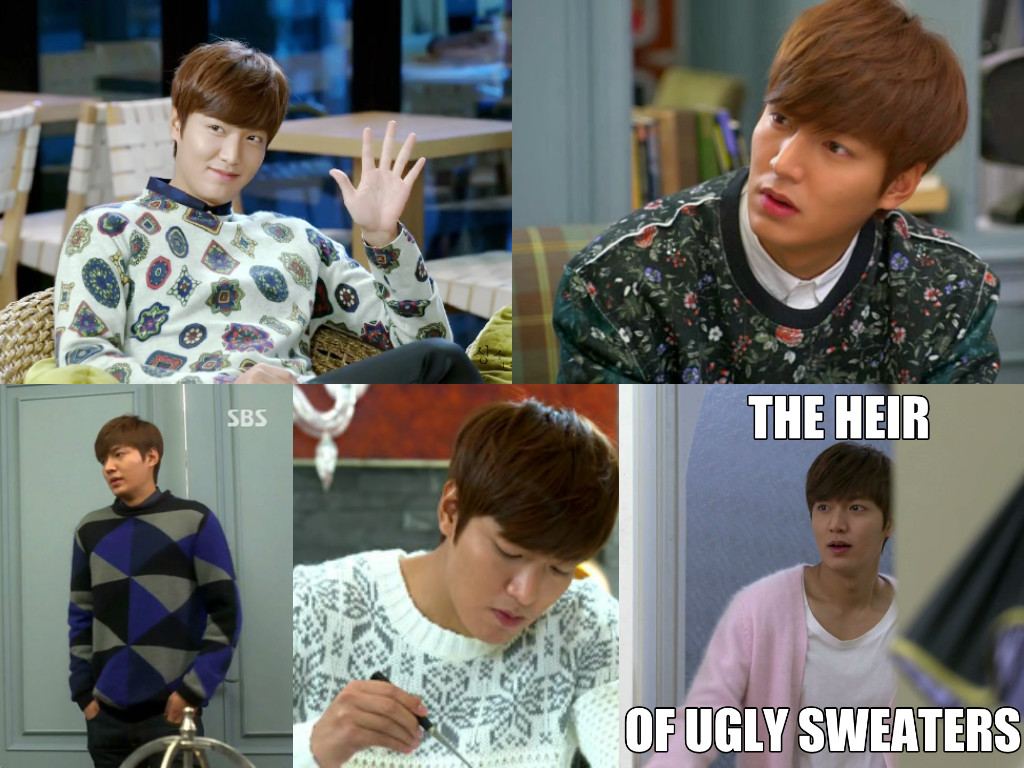
Maybe to make up for the fact that for most of the film the lovers will barely touch each other, when they do get to finally kiss, they really go for it. Because full-on, all-tongue, snogging is what you get. This is particularly fun to anticipate when you consider the usual height difference between the couples. A lot of cricked necks, is all I’m saying.
You’ll get one song which is played for every single romantic or heartbreaking moment, in every single episode. Thankfully, these are usually quite good, and don’t drive you mental after you’ve heard them a gazillion times. For really romantic moments, there will be rose petals or blossom falling from the sky.
This is an absolute must. The girl will trip and be caught by the guy, causing them to lock eyes and gaze helplessly at each other. Plus, there is the deluxe version where they end up on the ground, nose to nose, with one of them lying on top. The super deluxe is caused by the guy, and also involves him swivelling her around into his arms before he catches her. This is not for novice heroes.
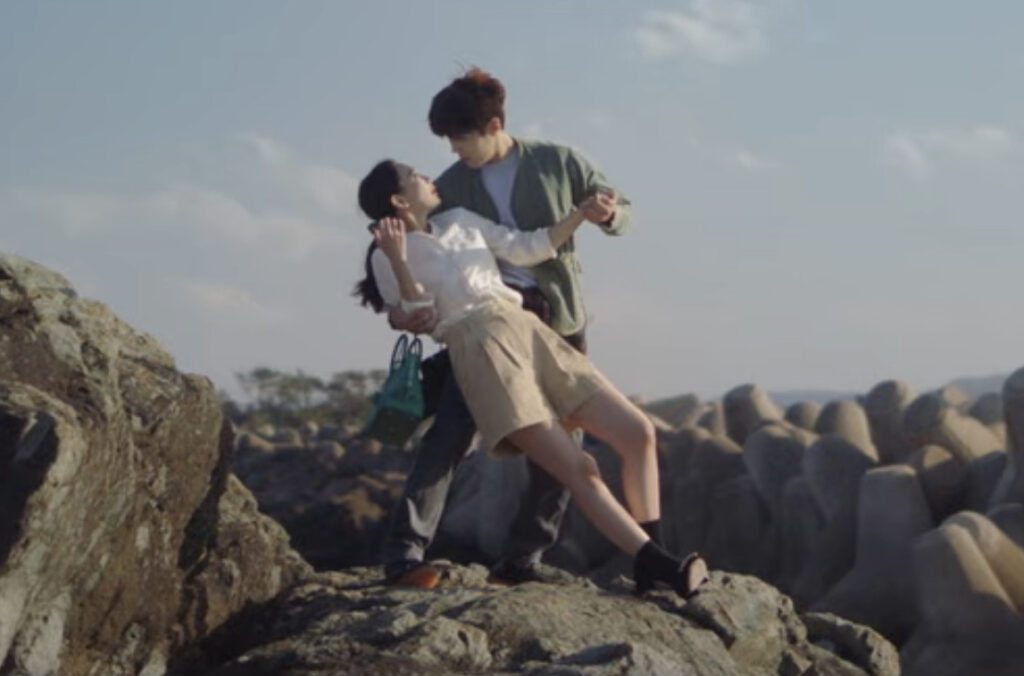
You may think that seeing these same tropes would get irritating, but I’ve found myself responding in the opposite way. I’m anticipating them, and gleefully thinking ‘here we go’ whenever one pops up. Why?
Because they are using them the way that ballet uses certain movements, or an opera repeats particular motifs. They are taking advantage of the history and resonance that each of these things brings, and judiciously allowing them to layer up the story.
It’s not a crazy idea. Think pantomime villains. As kids we all yelled, ‘he’s behind you,’ and booed when they came on stage. We didn’t get tired of it – it was fun. We knew what was expected of us and went along for the ride. Repetition added to the experience.
It’s the same with Kdramas. They use the same technique to pull from us emotions that are already connected to certain things. After all, a trope is merely this – a shorthand version of something everyone knows. Used wisely, it can enhance our work, and bring a moment of congruence and connectivity. It’s certainly paying dividends in Korea.
I think it’s time Trope stopped being a dirty word.
---
By @Vagabond Heart
Get the discussion going – post your thoughts & comments in the thread below…
---
Mention the word Trope to us writers and we’ll recoil. Add the word Cliche and you’ll see us running for the hills. These two five-letter words are not what any of us want in our wonderful, new, original, works, right? But consider this: things only become tropes when they are overused, and they only become overused in the first place, because they work.
The main element of any self-respecting Korean drama is its repetitive use of tropes. I had no interest in Kdramas until a friend insisted I watch one. Then someone else recommended another, and before I knew it I was hooked. I’ve watched a fair few now, so trust me when I say I’ve done some research on this.

Because of my Kdrama viewing history, Amazon is helpfully suggesting things I might want to buy.
Amazon is not wrong – this is now top of my birthday list.
Korean romances – the rules
All love stories, whether they are Korean or not, have the same goal here – something that keeps our couple out of each other’s reach while they overcome all obstacles and/or fall desperately in love. But while the rest of the world seems to be looking for fresh new takes on the genre, the Koreans are quite happy to repeat the same basic formulas. These include…
The hero
From what I can see, Koreans value status, money and food. They also seem to equate being well-dressed (designer brands, obviously) with having good taste.
So as well as being tall, handsome, stupidly young looking, and having flawless skin, our hero will be rich, important, pimped out to the nines, and probably a good cook. Most often he’ll be the CEO of some global corporation, but if he can’t, then he’ll be a chef.
The only time he won’t be a good cook is if it’s a costume drama. In which case he is always the King.

But he will be flawed. Every romantic hero I’ve seen, so far, has been some version of Mr Darcy. He tends to be rigidly cold, thoughtless, selfish, judgemental and vain, and has no interest in love whatsoever. It is the girl’s job to change him.
The heroine
Our lady will be the hero’s perfect counterpoint, filling in the gaps of what he lacks. Ergo, she is usually poor, struggling, determind, generous, charming and kind. It goes without saying she is also incredibly pretty, has even more peach-perfect skin than he does, and is tiny, and I mean barely up to his shoulder.
She comes in two basic packages: sweet and hard-working, or fiesty and hard-working. Either way, she is Cinderella.

The obstacles
For Koreans, money and status are the obvious blocks. Different social class is a biggie. CEO guy is usually expected to make an arranged marriage of financial or social convenience, for the good of the Company.
When it’s historical, he’s the King, so you can imagine how much of a problem it is if he falls in love with the serving girl.
They have some fun alternatives too: time-slips and amnesia are firm favourites. And body-swaps are a whole category by themselves. Nothing seems to entertain a nice, modest, Korean more than the idea of plonking a person’s soul into a body of the opposite sex, and watching them try to avoid handling their danglies.
Bedwear
Unlike the movies I’m used to, there is precious little kissing and almost no sex. Sometimes our couple will have spent the night together, but everything is implied rather than shown. Consequently, you almost never see them with their kit off. Because even if they do, eventually, get to cuddle up in bed together, they are wearing more clothes than I’d wear to go carol-singing. We’re talking roll-neck jumpers, long cardies, socks, the lot. Even coats, sometimes. I’m led to infer that Korean houses have no heating at night. And men’s jumpers are a whole other thing in Kdramas, believe me.

But the kissing tho
Maybe to make up for the fact that for most of the film the lovers will barely touch each other, when they do get to finally kiss, they really go for it. Because full-on, all-tongue, snogging is what you get. This is particularly fun to anticipate when you consider the usual height difference between the couples. A lot of cricked necks, is all I’m saying.
The song thing
You’ll get one song which is played for every single romantic or heartbreaking moment, in every single episode. Thankfully, these are usually quite good, and don’t drive you mental after you’ve heard them a gazillion times. For really romantic moments, there will be rose petals or blossom falling from the sky.
The signature move
This is an absolute must. The girl will trip and be caught by the guy, causing them to lock eyes and gaze helplessly at each other. Plus, there is the deluxe version where they end up on the ground, nose to nose, with one of them lying on top. The super deluxe is caused by the guy, and also involves him swivelling her around into his arms before he catches her. This is not for novice heroes.

Putting it all together
- Crash landing on You. They’ve put a twist in here and made her the CEO, so, to counter that, she gets to wear the terrible knitwear. The obstacle is that she’s from South Korea while he’s from North, so whole countries are trying to keep them apart.
- Mr Queen. Time slip AND body swap. Plus, the hero is a King, so he gets to do the signature move several times. Obstacle is a modern-day bloke has been swapped into the body of a Joseon-period Queen, and he really doesn’t want to get jiggy with the King.
- Secret Garden. Body swap. This time the hero and heroine end up being each other. He’s a CEO, of course. Obstacle – she thinks he’s a plank. Brilliant song (is now my repeat-play ear worm).
- Marry my husband. Both hero and heroine time slip back to previous versions of themselves. And yes, of course he’s a CEO. Some of the worst knitwear ever.
- Hyde, Jekyll, Me. This is a take on the amnesia thing – but this time they’ve given the obligatory CEO a split personality.
- Marriage Contract. He’s rich, but his mum needs a new liver. She’s poor and needs money for cancer treatment. Lots of chef activity. And some top snogging.
- Moon Embracing the Sun. He’s a King, she’s got amnesia and has gone missing, presumed dead. Lots of signature moves, but in costume, so plenty of swishing silk.
- A Time Called You. Body swap AND time slip. You need a degree to work who is who and when is when in this one.
- Flower Crew. Just started watching this yesterday. First episode has the signature move almost immediately, then the super deluxe one at the end, with full blossom. She’s feisty and poor, there promises to be a King very soon, and it’s looking good for a love triangle.
You may think that seeing these same tropes would get irritating, but I’ve found myself responding in the opposite way. I’m anticipating them, and gleefully thinking ‘here we go’ whenever one pops up. Why?
Because they are using them the way that ballet uses certain movements, or an opera repeats particular motifs. They are taking advantage of the history and resonance that each of these things brings, and judiciously allowing them to layer up the story.
It’s not a crazy idea. Think pantomime villains. As kids we all yelled, ‘he’s behind you,’ and booed when they came on stage. We didn’t get tired of it – it was fun. We knew what was expected of us and went along for the ride. Repetition added to the experience.
It’s the same with Kdramas. They use the same technique to pull from us emotions that are already connected to certain things. After all, a trope is merely this – a shorthand version of something everyone knows. Used wisely, it can enhance our work, and bring a moment of congruence and connectivity. It’s certainly paying dividends in Korea.
I think it’s time Trope stopped being a dirty word.
---
By @Vagabond Heart
Get the discussion going – post your thoughts & comments in the thread below…

